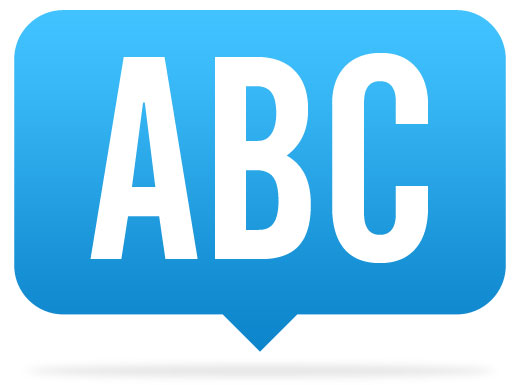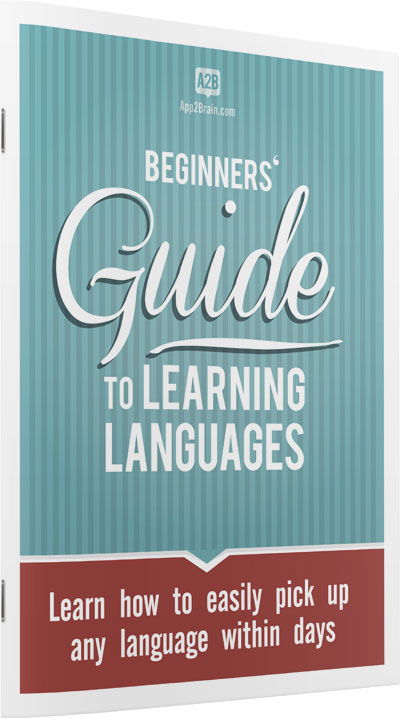The Russian alphabet might seem a bit strange at first. It includes 33 letters, two of which do not produce any sounds. Also, the Russian alphabet (called “Cyrillic”) is not phonetic, which means there’s no strict correlation between the sound and the letter.

This lesson is part of our Beginners’ guide to learning Russian series, which also contains the following lessons:
Culture note
Cyrillic is called so after one of two brothers, Byzantine monks called Cyril and Methodius, who invented the Slavic written language and letters for the Slavic tribes in 863 AD. Cyrillic is used not only in Russian, but also in Ukrainian, Belorussian, Bulgarian, Serbian, and Macedonian, Turkmen, Uzbek, Kazakh, and Kirghiz as well as some minor languages such as Mordovian and so on.
Do not be afraid – although the Russian alphabet might seem strange at first, it’s rather easy to remember.
In the following table the first column indicates the letter, the second its name, in the third there is an international transcription sign and how it will be marked in this book. If there’s something like “it indicates palatalization. The palatalized consonants are marked as ‘, e.g. льёт – l’yot.
To pronounce a palatalized sound you should say the consonant and the short sound [j] afterwards. This should be very short, almost one and the same with the original sound. This might be difficult at first, but try to listen and repeat, watch the videos below and you will overcome this difficulty.
Video: Learn the Russian alphabet
Created by App2Brain.com
Remember, you can come back to the table below any time you need. Besides, most of the texts include the written English transcription of the Russian words.
The Russian Alphabet
| Letter | Letter name | Transcription | How to read it | |
|---|---|---|---|---|
|
|
А а
|
а
[a] |
/a/ – ah/uh/u
|
Stressed – like a in father.
Unstressed – like a in human
|
|
|
Б б
|
бэ
[bɛ] |
/b/ or /bʲ/ – b/p
|
Usual – like b in book or be.
At the end of the word – p like in plan |
|
|
В в
|
вэ
[vɛ] |
/v/ or /vʲ/ – v/f
|
Usual –like v in victory, verse.
At the end of the word – like f in file. |
|
|
Г г
|
гэ
[ɡɛ] |
/ɡ/ – g/k
|
Usual – like g in great, garden
At the end of the word – like k in Greek
|
|
|
Д д
|
дэ
[dɛ] |
/d/ or /dʲ/ – d/t
|
Usual – like d in duck, die.
At the end of the word – like t in town. |
|
|
Е е
|
е
[je] |
/je/, /ʲe/ or /e/ – ee/ye/e
|
Stressed – like ye in yes.
Unstressed – like ee in see.
|
|
|
Ё ё
|
ё
[jo] |
/jo/ or /ʲɵ/ – yo
|
Like yo in yoke. This vowel is always stressed.
|
|
|
Ж ж
|
жэ
[ʐɛ] |
/ʐ/ – zh/sh
|
Usual – like s in pleasure, measure
At the end of the word – like sh in shift
|
|
|
З з
|
зэ
[zɛ] |
/z/ or /zʲ/ – z/s
|
Usual – like z in zebra, zoo.
At the end of the word – like s in sleep
|
|
|
И и
|
и
[i] |
/i/ or / ʲi/ – ee
|
Stressed/unstressed – like ee in peep, peek
|
|
|
Й й
|
и краткое
[i ˈkratkəɪ] |
/j/ – j
|
This is a consonant which is pronounced like final y in boy.
|
|
|
К к
|
ка
[ka] |
/k/ or /kʲ/ – k
|
Pronounced like k in kite.
|
|
|
Л л
|
эл or эль
[ɛl] or [ɛlʲ] |
/l/ or /lʲ/ – l
|
Pronounced like l in light, lamp.
|
|
|
М м
|
эм
[ɛm] |
/m/ or /mʲ/ – m
|
Pronounced like m in mother, miracle.
|
|
|
Н н
|
эн
[ɛn] |
/n/ or /ɲ/ – n.
|
Pronounced like n in notebook.
|
|
|
О о
|
о
[о] |
/o/ – oh, ah, uh, u, a
|
Stressed – oh like a in talk
Usntressed – either ah like in park or uh like o in season.
|
|
|
П п
|
пэ
[pɛ] |
/p/ or /pʲ/ – p
|
P like in park.
|
|
|
Р р
|
эр
[ɛr] |
/r/ or /rʲ/ – r
|
There is no such sound in English, it is like Spanish or Italian r in such words as madre or ragazza. It’s a flap r. Listen to the examples to get better idea how is it pronounced.
|
|
|
С с
|
эс
[ɛs] |
/s/ or /sʲ/ – s
|
Pronounced like s in see.
|
|
|
Т т
|
тэ
[tɛ] |
/t/ or /tʲ/ – t
|
Pronounced like t in tea or tie, but without aspiration. The tongue is located closer to the teeth than in English.
|
|
|
У у
|
у
[u] |
/u/ – oo
|
Pronounced like oo in book or shoot.
|
|
|
Ф ф
|
эф
[ɛf] |
/f/ or /fʲ/ – f
|
Pronounced like f in fact, fast.
|
|
|
Х х
|
ха
[xa] |
/x/ – kh
|
There is no such sound in English, the closest will be German ch, or the Kh – it’s harder than h in English and is stronger. Listen to the example.
|
|
|
Ц ц
|
це
[tsɛ] |
/t͡s/ – ts
|
There is no such sound in English, the closest will be ts in cats or dots, while pronounced not like two sounds, but like one.
|
|
|
Ч ч
|
че
[tɕe] |
/t͡ɕ/ – tch
|
Pronounced like ch in chair.
|
|
|
Ш ш
|
ша
[ʂa] |
/ʂ/ – sh
|
Pronounced like sh in short, sharp.
|
|
|
Щ щ
|
ща
[ɕɕæ] |
/ɕɕ/ – sh’
|
The palatalized version of sh, the closest is sh in sheep.
|
|
|
Ъ ъ
|
твёрдый знак
[ˈtvʲɵrdɨj znak] |
—
|
This letter (“hard sign” it’s called) gives no sound and occurs only between a consonant and a vowel in the words like “въезд” (entry) and shows that the consonant is not palatalized.
|
|
|
Ы ы
|
ы
[ɨ] |
[ɨ] – ih
|
This sound is similar to ih, but the lips are moved more forward and the closest is ee in week or weep, still with lips moved forward. Listen to the examples.
|
|
|
Ь ь
|
мягкий знак
[ˈmʲæxʲkʲɪj znak] |
/ʲ/
|
This letter (“soft sign”) also doesn’t denote any sound, it means that the preceding consonant is palatalized: мышь
|
|
|
Э э
|
э
[ɛ] |
/ɛ/ – e
|
Pronounced like e in the word end, men.
|
|
|
Ю ю
|
ю
[ju] |
/ju/ or /ʲʉ/ – yu
|
Pronounced like u in use.
|
|
|
Я я
|
я
[ja] |
/ja/ or /ʲæ/ – ya, ye, yi
|
Stressed – like ya in yard.
|
Videos: The Russian Alphabet Made Easy
True Friends: A and К
M, O, and T
E and H
B and P
C, У and Х
Б and Г
Д and З
Videos created by Russianpod101.com
Phonetics & pronunciation rules
So as we have started with the alphabet, let’s get to the phonetics and pronunciation rules:
- There are 21 consonant letters in Russian:
б, в, г, д, ж, з, к, л, м, н, п, р, с, т, ф, х, ц, ч, ш, щ. - The consonant letter й is sometimes called a semivowel.
- There are 10 vowel letters:
а, э, ы, у, о, я, е, ё, ю, и. - Two letters of the Russian alphabet do not indicate any sounds. They are the “soft sign” (ь) and the “hard sign” (ъ).
- If you want to sound more Russian, do not shorten the vowels, and try to make stressed sounds a bit longer.
- You might have noticed that there are two readings not only for the vowels, but also for the consonants. They usually become voiceless at the end of the words.
- Another important thing is the principle “one letter – one sound”. Of course, there are exceptions (like ч in words like “что” is read like sh – shto), but in most of the cases in Russian there is only one sound the letter can indicate, though its quality may change.
- The consonants p, t and k are not aspirated in Russian.
- The voiced consonants in Russian at the end of the words become voiceless: огород is pronounced like uhgahroht
- There are some cases when the consonant is not read in Russian: солнце (sohntse), здравствуй (zdrahstvuj). They’re rare and you should remember them.
In our grammar course, Russian pronunciation will be presented in a kind of transcription using Latin letters that will make it easier for you to understand how things are pronunced.
Word Stress & more pronunciation rules
The word stress in Russian is one of the most difficult parts of its phonetics.
There are two important things about Russian word stress.
- First – it is quantitative, the stressed vowel is pronounced longer than the unstressed.
- Second – It’s sometimes hard to say where the stress should fall.
Also bear in mind that word stress changes the quality of the pronunciation of letters as you can see from the alphabet table. It’s also very important because the word stress may change the nature of the word: зàмок and замòк (accent indicates the stress) are written the same, one is pronounced zAhmuk, the other –zumOHk, thus the first means “castle” and the second “lock”.
Unfortunately there are no strict rules about the word stress in Russian. The only way is just to learn the words and look them up in a dictionary. Don’t be afraid, when you begin reading the texts, listen to the dialogues and so on, you will remember the stress.
Throughout our grammar course, the stressed vowel will be highlighted in the texts as Здравствуйте.
The vowels change their nature when they are not stressed.
Introduction to Perfect Russian Pronunciation
Top 5 Russian Pronunciation Mistakes to Avoid
Exercise
Try to read the words. If you have difficulties, consult the recording and the transcripts in the table above.
- Хорошо, весёлый, мастер, мама, лето, ветер.
- Тишь, глушь, мышь, крыша, шишка, мишка.
- Свет, лист, мох, хворь, моль, мол, вирши.
- Радуга, папа, дедушка, чистота, сквер.
Listen to pronunciation
This lesson is part of our Beginners’ guide to learning Russian series, which also contains the following lessons:

Download your free language learning guide
Our free 18-page PDF ebook will teach you how to:
- Get (and stay) motivated learning a new language
- Achieve 80% of your goals with only 20% of the effort
- Make your learning experience more fun than ever
More Russian lessons
- Russian grammar (Overview)
- Russian Alphabet & Pronunciation
- Russian Language & Culture
- Numbers in Russian
- Basic Conversation in Russian
- Basic Russian Verbs
- Basic Russian Nouns
- Basic Russian Adjectives
- Colors & Appearance in Russian
- Countries & Languages in Russian
- Date & Time in Russian
- Holidays & Good wishes in Russian
- Food & Drinks in Russian
- People & Professions in Russian
- Family & Friends in Russian
- Body & Health in Russian
- Cities & Traffic in Russian
- Travelling & Leisure time in Russian
- Russian videos
- Vocabulary Trainer: Russian
- Overview: Learn Russian

Leave A Comment